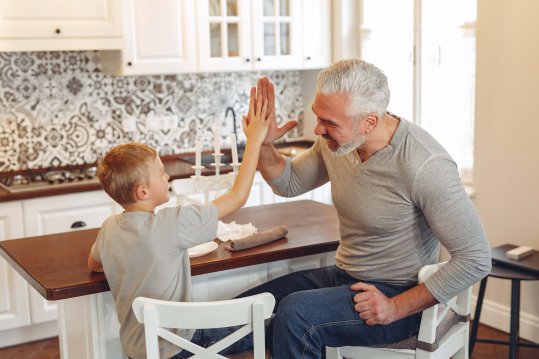Family festival of laughter. How to secure daily little pleasures?

Feeling joy not only gives us pleasure, but also has regenerating properties. When we laugh, we stimulate endorphins, i.e. the hormones of happiness. These, in turn, are responsible for our well-being and self-satisfaction. You could also say that this is our capital for the future. Experiencing joy opens access to other positive emotions and helps with being more optimistic and spontaneous.
Sources of joy
It’s worth celebrating and remembering what brings us joy. And how to cast your mind back to those moments? For example, by making a family poster under the slogan “Our sources of joy”. You’ll need small sheets of paper. Each household member draws or writes on them what they have enjoyed most recently. How many joyful memories do you have? The more, the better! Stick the finished works on a large sheet of paper or tape them together. Discuss what gives you the biggest joy and what makes you happy.
Focus on what you can do here and now. Larger trips, such as the one to the funfair, can be planned for later so that the idea doesn’t get banished. Hang the poster in a visible place to cheer you up every day and inspire you when choosing activities.
Laughter is the best medicine!
In addition to natural, spontaneous situations that make you laugh, you can plan a laughter training. Start with a warm-up in the form of movement exercises, e.g. stretching or breathing exercises to prepare the lungs. Even if it’s forced, laughter brings many benefits, and a self-conscious chuckle can turn into spontaneous laughter.
Let’s play!
In the situation which we find ourselves in, we’re experiencing various emotions caused by tension, stress and inability to work it off. Let’s try to find a way to enjoy being together, e.g. by playing together.
For children, toys are a secondary matter. What’s most important is the attention and interest that we offer them. Playing is not a job which needs to be done. It’s supposed to be a moment of respite, a break from everyday life, a trip to an alternative world. What is your task? Be close, assist, observe, listen, follow the child’s lead and make suggestions. Let the child experiment and fantasise. Let your own inner child take over.
Don’t be too competitive in games, but, despite the fact that children love to win, don’t give them head start. The older the child, the faster they will realise that something is wrong and they’ll fail to build their self-confidence. Such situations help the child get used to the fact that sometimes you win and sometimes you lose. Your job as a parent is to capture the feelings and emotions of your child and to name them rather than oppose them. Let the child be upset when they lose. In this way, children learn what they are experiencing, become aware of what is happening to them and know that they can cope with their emotions.
Turn on the movement – a family dance of joy
Nothing makes you stronger than sharing your joy with others. It’s important that we are able to enjoy something as a family. Together, invent and perform a dance of joy. Suggest steps, gestures and a joyous cry. Dance together! Discuss how you feel when you do something together and identify these emotions. Perform the dance of joy whenever there’s an opportunity.
Being together brings joy
For your child, doing housework with you may be a source of joy. Cleaning, cooking or tinkering together can be a challenge, but it’s a lot of fun for them. You can also seize such an opportunity to talk about what they enjoy the most. To support and appreciate their efforts. If the child remembers the time you spent together as something joyful, there is a chance that they’ll be motivated to repeat this experience.
How to end the day well?
Even small things such as nice weather or a delicious breakfast can give us joy. It’s worth seeing them! They make up our sense of happiness. Before you go to bed, think about what happened to you today and finish the following sentence: “Today I enjoyed...”
All source materials are prepared by the team of Kulczyk Foundation’s Education Department in cooperation with teachers and experts – pedagogists, psychologists and cultural experts – and verified by an experienced family therapist Kamila Becker. Kinga Kuszak, PhD, Professor of Adam Mickiewicz University, Faculty of Educational Studies, provides content-related supervision over Kulczyk Foundation’s educational materials. All materials are covered by the content patronage of the Faculty of Educational Studies of Adam Mickiewicz University.
The article was published on 15.04.2020 on the website of Instytut Dobrego Życia (Good Life Institute)
Authors: Dorota Szkodzińska (Kulczyk Foundation) and Anna Woźniak (Instytut Dobrego Życia)

